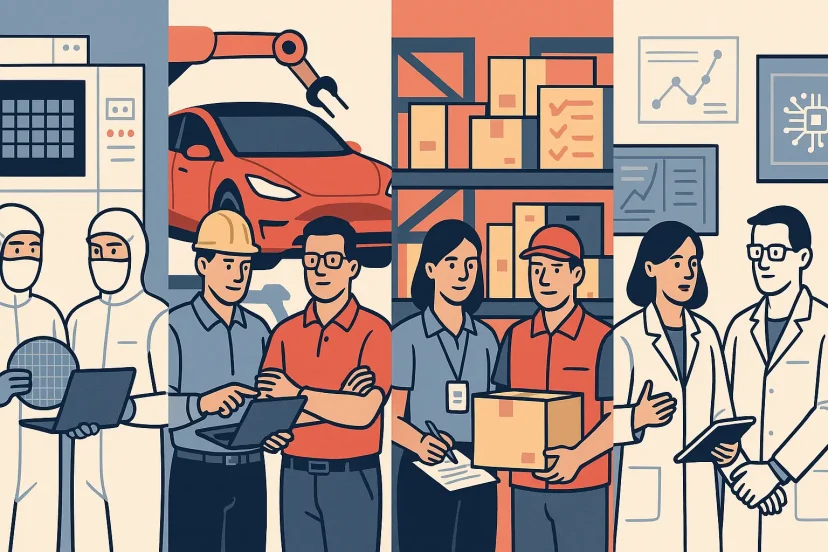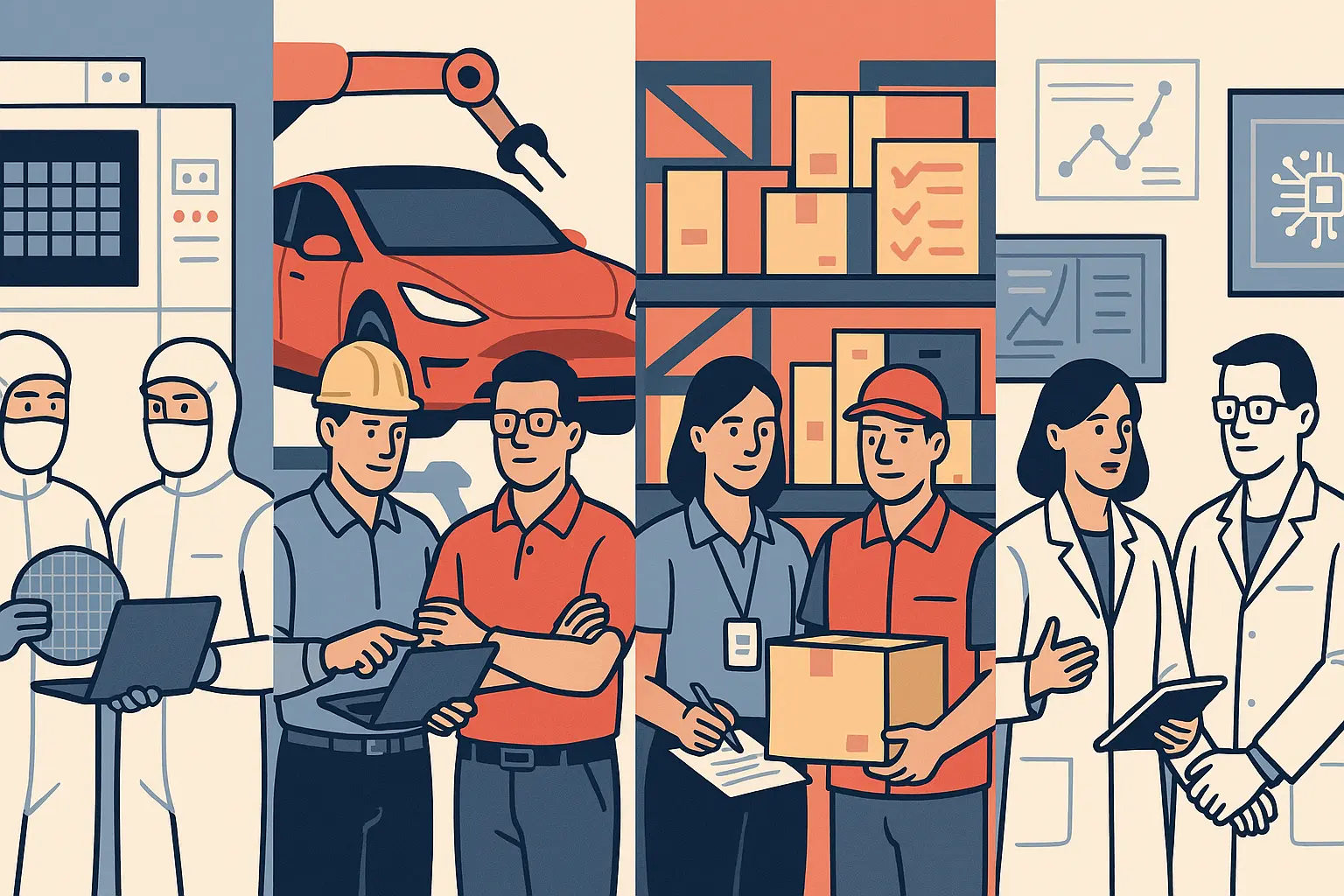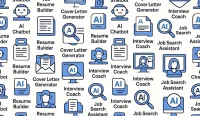What Is the Tesla Samsung Chip Deal 2025?
Elon Musk has confirmed that Tesla has signed a $16.5 billion chip contract with Samsung Electronics, one of the largest semiconductor deals in the history of the automotive and AI industries. This long-term agreement will enable Samsung Foundry to produce Tesla’s next-generation custom AI6 chips, specifically designed to power autonomous vehicles, robotics, and the broader AI infrastructure Tesla is building.
The chips will be manufactured at Samsung’s advanced fabrication facility in Taylor, Texas. This partnership not only strengthens Samsung’s foothold in the American chipmaking market but also marks a strategic milestone in Tesla’s bid to control more of its AI hardware stack domestically.
A Strategic Shift in Global Chip Manufacturing
This move is widely seen as a strategic victory for Samsung Foundry over rival TSMC (Taiwan Semiconductor Manufacturing Company), which has long dominated advanced chip manufacturing contracts. By securing Tesla as a marquee U.S. client, Samsung has positioned itself as a serious competitor in the global race to supply AI-optimized semiconductors.
Furthermore, this partnership signals a shift toward localized chip production, aligning with U.S. national objectives under the CHIPS and Science Act. With geopolitical tensions rising and supply chain disruptions fresh in memory, this deal reinforces the importance of semiconductor sovereignty.
U.S. Job Creation: A Major Upside
While headlines highlight the contract value, the ripple effects on U.S. employment are equally substantial. The chip deal is expected to generate thousands of jobs across multiple verticals:
1. Semiconductor & Foundry Jobs
Samsung’s Taylor, Texas fab will require hundreds of cleanroom technicians, semiconductor engineers, and maintenance professionals to scale operations for Tesla’s chip volumes. Additional hiring will extend to equipment calibration, quality control, and yield optimization teams.
2. EV Hardware and AI Infrastructure Roles
Tesla will likely expand its hiring of hardware-software integration specialists, embedded systems engineers, and AI accelerator developers to fully leverage its proprietary AI6 chip. These roles are critical in translating chip-level performance into real-world autonomy and robotics.
3. Supply Chain & Logistics
From silicon wafers to chip packaging and delivery, a robust network of logistics coordinators, materials handlers, and quality inspectors will be essential. Both Tesla and Samsung will rely on U.S.-based subcontractors, creating a halo of support jobs.
4. Research & Development
Innovation doesn’t stop at production. Research labs and academic partnerships will see growth in areas like neural chip optimization, fab simulation, and thermal management. Expect more internships, fellowships, and post-doc programs around AI hardware in elite U.S. institutions.

Timeline: When Will the Hiring Surge Begin?
Hiring momentum is already building as Samsung accelerates construction and operational capacity in Texas. Here’s a forecasted timeline based on industry sources:
- Q3–Q4 2025: Cleanroom hiring, fab technicians, facilities management
- Early 2026: Ramp-up in chip engineers, QA teams, and packaging roles
- Mid to Late 2026: Tesla onboardings for chip integration and performance teams
- 2027 onward: Supply chain expansion and long-term R&D roles emerge
This phased timeline means sustained job creation across several years, offering both immediate and long-term opportunities.
Global Talent Competition Heats Up
The Tesla Samsung chip deal also underscores intensifying global competition for semiconductor talent. By choosing Samsung’s U.S.-based operations, Tesla sends a clear message: the future of AI chips must be built closer to home.
This could further incentivize skilled engineers in Asia and Europe to consider U.S. roles, as immigration pathways for STEM professionals align with national hiring goals. Domestic talent pipelines will also benefit from increased STEM funding and partnerships between universities and chipmakers.
Hiring for Chip, AI, or EV Roles?
Post your job openings on WhatJobs and connect with top talent in semiconductor engineering, cleanroom ops, embedded AI, and advanced logistics. Our platform helps you find qualified professionals quickly and securely—at no cost.
Post Jobs for Free on WhatJobs →Skills in High Demand
This deal highlights several technical domains that are poised for explosive growth:
- ASIC and SoC Design: Engineers proficient in EDA tools, RTL design, and verification
- Cleanroom Operations: Technicians trained in photolithography, etching, and wafer inspection
- AI Hardware Acceleration: Specialists in low-latency computing and neural net optimization
- Embedded Systems: Developers integrating chipsets with Tesla’s FSD (Full Self-Driving) software
- Thermal & Power Engineering: Experts who manage high-performance chip heat and power profiles
Courses, certifications, and real-world project experience in these areas will be crucial for job seekers.
Final Thoughts
The Tesla Samsung chip deal 2025 is more than a contract—it’s a catalyst. A catalyst for semiconductor innovation, for American manufacturing resurgence, and for the careers of thousands of professionals across engineering, logistics, and research.
As AI becomes the backbone of mobility and smart infrastructure, this partnership marks a historic inflection point in aligning corporate ambition with national workforce development. Those who position themselves now will be the ones building the future.




